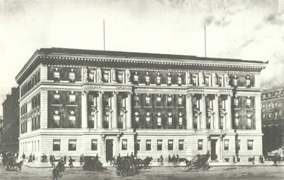Our Years of Achievement
Weill Cornell Medical College was founded in 1898, with April 14, 1898, marking the official date. The Medical College was established and generously endowed through the gifts of Colonel Oliver H. Payne and quickly became a national leader in medical instruction. Since its inception, the Medical College has followed an educational philosophy that emphasizes the importance of combining a strong basic foundation in the medical sciences with extensive clinical training in patient care.
In 1927, the Medical College affiliated with what is now NewYork-Presbyterian Hospital, and in 1932, the two institutions opened their joint campus on the Upper East Side of Manhattan. Today, Weill Cornell Medical College continues to be one of the top-ranked clinical and medical research centers in the country.
The mission of the Medical College is to provide the finest education possible for medical students and students pursuing advanced degrees in the biomedical sciences, to conduct research at the cutting edge of knowledge, to improve the health care of the nation and the world, and to provide the highest quality of clinical care to the community.
Weill Cornell physicians and scientists have paved the way for such medical advances as the Pap test for cervical cancer, the first "double-blind" controlled experiment to test the efficacy of drugs, the synthesis of penicillin, and the synthesis of the hormone oxytocin that is crucial to childbirth - and are currently pioneering clinical testing of gene therapy for heart disease.
As an integral part of a world-renowned center of academic medicine and biomedical research, Weill Cornell Medical College is uniquely positioned to train future physicians and medical scientists. The Medical College and the Weill Cornell Graduate School of Medical Sciences maintain major affiliations with NewYork-Presbyterian Hospital, Memorial Sloan-Kettering Cancer Center, The Rockefeller University, and the Hospital for Special Surgery, as well as with the New York Metropolitan-area institutions that constitute NewYork-Presbyterian Healthcare System.
These significant alliances - coupled with the Medical College's longstanding commitment to excellence in research, teaching, patient care, and the advancement of the art and science of medicine - will ensure that Weill Cornell Medical College remains at the forefront of scientific and clinical scholarship for the next 100 years and beyond.



